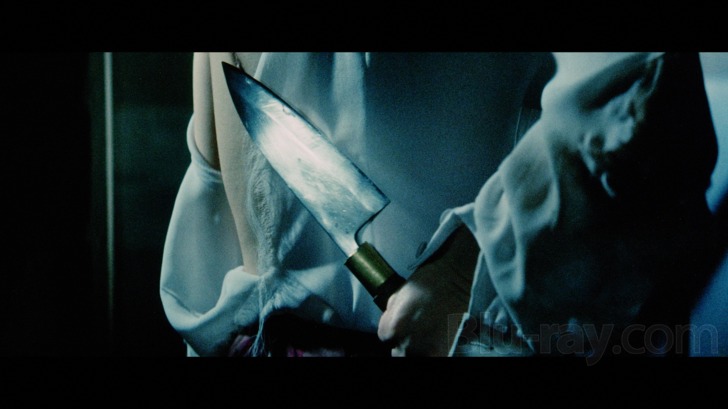Female Prisoner Scorpion: Beast Stable Blu-ray Movie
HomeFemale Prisoner Scorpion: Beast Stable Blu-ray Movie 
Blu-ray + DVDArrow | 1973 | 87 min | Not rated | No Release Date

Price
Movie rating
7 | / 10 |
Blu-ray rating
| Users | 0.0 | |
| Reviewer | 2.5 | |
| Overall | 2.5 |
Overview
Female Prisoner Scorpion: Beast Stable (1973)
Matsu is sheltered by an incestuous prostitute on her run from the police, her ex-prison mate and a cop whose arm she hacked off.
Starring: Meiko Kaji, Yayoi Watanabe, Kôji Nanbara, Takashi Fujiki, Tomoko MayamaDirector: Shunya Itô
| Foreign | 100% |
| Drama | 39% |
| Crime | 11% |
Specifications
Video
Video codec: MPEG-4 AVC
Video resolution: 1080p
Aspect ratio: 2.39:1
Original aspect ratio: 2.35:1
Audio
Japanese: LPCM Mono (48kHz, 24-bit)
Subtitles
English
Discs
Blu-ray Disc
Two-disc set (1 BD, 1 DVD)
DVD copy
Playback
Region A (B, C untested)
Review
Rating summary
| Movie | 2.5 | |
| Video | 2.0 | |
| Audio | 3.0 | |
| Extras | 3.0 | |
| Overall | 2.5 |
Female Prisoner Scorpion: Beast Stable Blu-ray Movie Review
Reviewed by Jeffrey Kauffman August 13, 2016Note: This film is currently available as part of the box set Female Prisoner Scorpion: The Complete Collection.
The damsel in distress has been a cinematic staple since the earliest day of the silents, when aghast audiences were horrified by the sight of
some
dastardly villain tying a helpless heroine to the railroad tracks (or something like that). Interestingly, that plot device underwent a subtle but
ultimately
kind of significant change decades later when the whole “women in prison” subgenre started cropping up. Suddenly, the damsels weren’t just in
distress, they were surrounded by leering people ostensibly in power, and they also had to suffer various indignities fostered by their fellow
inmates.
This almost fetishitic subject matter had a zenith of sorts in a series of Japanese exploitation films that began with 1972’s Female Prisoner
#701:
Scorpion, a series which appeared probably not so coincidentally just as feminism was really starting to gain a toehold globally. Featuring
Meiko
Kaji, who would go on to star in the Female Prisoner Scorpion sequels as well as the somewhat tonally
similar
The Complete Lady Snowblood, the
Female Prisoner Scorpion films are fascinating not just for their often lurid content, but also for presentational aspects that are oddly if
quite
interestingly theatrical, giving the films a bit of both the mundane and the arcane.

All four of the films in Female Prisoner Scorpion: The Complete Collection start with a disclaimer of sorts alerting the wary viewer that the incidents depicted in the film bear “no connection to reality whatsoever”. That, to put it mildly, is an understatement, and there’s probably no better example across the many examples this series offers than the opening couple of minutes of Female Prisoner Scorpion: Beast Stable, the third film in the series and one which actually begins out in the big, wild world rather than some grimy jail. Nami (Maiko Kaji) is seen riding a subway, evidently anonymously going about whatever life she’s been able to cobble together out of stir—at least, that is, until she’s suddenly accosted by a gaggle of plainclothes policemen who just appear out of nowhere to arrest her. In the resulting melee, Nami is actually able to escape, but only after she saws off the arm of one cop who has handcuffed himself to her. She then takes off on a mad dash through several urban environments with the bloody stump of her ostensible captor attached to her wrist, to the apparent befuddlement of scores of innocent bystanders. “No connection to reality whatsoever” indeed.
That disconnect continues, albeit in a perhaps even more disturbing way, once Nami manages to find a refuge of sorts, after she’s spotted in a graveyard attempting to scrape the handcuff off of her wrist on a headstone, in a probable reference to the spoon scraping gambit that is the opening scene of Female Prisoner Scorpion: Jailhouse 41. The woman spotting her, a prostitute named Yuki (Yayoi Watanabe), is a little freaked out to see a disheveled woman with three fourths of an arm dangling from her handcuffed wrist, but, hey, you know, not enough to keep her from inviting Nami back to Yuki’s place (in a development which is completely elided, simply segueing to Nami being at Yuki’s abode).
Unfortunately for Nami (and actually probably even more so for Yuki), Yuki lives with her “big brother” who is brain damaged and with whom she’s having an incestuous relationship. Yuki expresses her extreme disappointment with her sibling when he tries to amorously attack Nami as she sleeps. “Don’t I give you as much sex as you need?” she asks plaintively. Evidently not, though it’s notable that in this film it’s not Nami who is repeatedly subjugated and forced into untenable sexual situations. Or at least, Nami isn’t the only one so traumatized.
The film really kicks into high gear once an unapologetically cartoonish madam named Katsu (Reisen Lee) enters the fray. Dressed like the villainous little sister of Ming the Merciless in Flash Gordon, replete with a cowl that virtually screams “nefarious”, Katsu assaults Yuki with a golf club (yes, that way), and later imprisons Nami after having drugged her. It of course turns out that Nami and Katsu have a “history” and that Katsu is only too happy to repay certain “favors” on Nami now that she (Katsu) is in control of the proceedings. Meanwhile, the newly one armed police detective is leading a coterie of cops on the hunt for Nami.
Female Prisoner Scorpion: Beast Stable is actually one of the more straightforward films in the series from a narrative standpoint. It indulges in relatively fewer of the stylistic conceits of the first two films, and has fewer of the overt theatrical sensibilities that inform those outings. It’s perhaps therefore even more disturbing than the first two films, in that the unseemly behaviors so often on display aren’t mitigated by what might be termed a whimsical presentational style.
Female Prisoner Scorpion: Beast Stable Blu-ray Movie, Video Quality 

All four films in Female Prisoner Scorpion: The Complete Collection exhibit some of the same tendencies, and so I'll begin each review with some general comments about the set, including Arrow's description of the provenance of the transfers, before moving on to specific comments about each individual film. Arrow's verbiage on the transfers is as follows:
The films of the Female Prisoner Scorpion Collection have been exclusively restored in 2K resolution for this release by Arrow Films and are presented in their original theatrical aspect ratio of 2.35:1 [Note: The Blu-ray ARs are actually 2.39:1] with mono sound.In order to better understand what is on tap for the viewer in these presentations it's probably important to try to unpack what the preceding spiel "really" means. The fact that Arrow is commendably forthcoming to state that these were sourced off of low contrast 35mm prints explains one thing, but what exactly the "original 35mm film elements" were is something else entirely, and I personally suspect we're dealing with secondary source elements to begin with (if someone out there has definitive information, pass it along and I'll happily update the review). All four films exhibit "dupey" tendencies, apart and aside from problems introduced by the low contrast source. These include variable (and at times pretty problematic) grain structure, some mosquito noise intruding, especially in darker scenes, horizontal banding/clumping of grain and just a generally roughhewn appearance that often tends to defeat detail and especially fine detail levels. Dark scenes are often littered with crush, and due to the frequent skewing toward blue, blacks can often appear purplish and flesh tones often assume an almost ghastly pallor. In all four films when things venture out of doors in brighter lighting conditions, the palette improves at least incrementally, but there's really nothing here that looks vivid or, more saliently, natural. A little oddly (at least to me), considering the blue look of the films, reds and oranges often come off looking at least relatively better than some other tones.
A set of low-contrast 35mm prints struck from the original 35mm film elements were supplied by Toei Company, Ltd. These prints were scanned in 2K resolution on a pin-registered 4K Northlight Scanner. Picture grading was completed on a DaVinci Resolve and thousands of instances of dirt, debris and light scratches were removed using PFClean software. Overall image stability and instances of density fluctuation were was also improved. All restoration work was completed at Pinewood Studios.
The images on all four Female Prisoner Scorpion films favor a noticeably cyan/blue look throughout. This look was inherent in the film materials supplied and relates to how these lab materials were created, as well as how the original elements have faded over time. With these restorations, we have aimed to present the films as close to their intended original style and appearance as possible.
Beast Stable continues the downward spiral for the films' video quality, something that's on display from virtually the first moment, when the opening (optically printed) sequence is littered with mosquito noise. Later, at around 4:15, during the horrifying first scene with Yuki and "Big Brother", again mosquito noise swarms over the scene, and as I've noted in other reviews, flesh tones tip perilously close to "Martian" green territory. Many of the dark interior scenes have rampant crush, with (again, as noted in other reviews) elements like hair just disappearing into the surrounding shadows. As with other films, there are brief respites where suddenly things look okay, or at least relatively decent. One of these is at around 39:00, where out of the blue (sorry) flesh tones suddenly look fairly normal, but that then reverts to the crush laden, blue heavy look when Nami survives in the sewers in the Female Prisoner Scorpion version of The Third Man. Pay attention during the closing credits, though—suddenly Nami's flesh tones are a good, ruddy pink as superimposed titles come into the frame.
Female Prisoner Scorpion: Beast Stable Blu-ray Movie, Audio Quality 

All four films feature LPCM Mono tracks in the original Japanese (with optional English subtitles). There's slight but noticeable distortion in the upper midrange, especially during cues. It's somewhat more prevalent in some of the more intense cues, especially those featuring koto (as in Jailhouse 41). #701's Grudge Song probably sounds the best of the bunch, but it's notable that the entire mix seems a little hotter on that film than on the other three. All four films deliver dialogue without much problem, and sound effects (i.e., blades slashing, bullets flying) are generally decent if not overwhelmingly powerful.
Female Prisoner Scorpion: Beast Stable Blu-ray Movie, Special Features and Extras 

- An Appreciation by Kat Ellinger (1080p; 25:48) is a 2016 interview which focuses on some of the underlying misogyny and violence depicted in the films.
- Shunya Ito: Directing Meiko Kajo (1080p; 17:32) features more from the same 2006 interview that is also featured as one of the supplements on Female Prisoner #701: Scorpion.
- Unchained Melody: A Visual Essay by Tom Mes (1080p; 21:30) is an interesting overview of Meiko Kaji's filmography.
- Trailers
- Original Teaser (1080p; 1:46)
- Original Theatrical Trailer (1080p; 3:08)
- Credits (1080p; 00:55) is a list of credits since Arrow chose not to subtitle the actual credits sequence, other than the title song lyric.
Female Prisoner Scorpion: Beast Stable Blu-ray Movie, Overall Score and Recommendation 

Beast Stable is in some ways the most cartoonish of the films in this series, especially with regard to the hiss worthy villainness, but that probably only makes it even more difficult to handle since the overtly theatrical presentational style is largely absent. There's a noticeable law of diminishing returns starting with this third film, and the problematic video quality only adds to the disappointment.
Similar titles
Similar titles you might also like
(Still not reliable for this title)

Female Prisoner Scorpion: #701's Grudge Song
1973

Female Prisoner #701: Scorpion
1972

Female Prisoner Scorpion: Jailhouse 41
1972

Rainy Dog
1997

Stray Cat Rock: Machine Animal
1970

Stray Cat Rock: Beat '71
1971

Ley Lines
1999

Two Men in Town
Deux hommes dans la ville
1973

The Wild Goose Lake
南方车站的聚会 / Nán fāng chē zhŕn de jů huě
2019

Pixote
Pixote: A Lei do Mais Fraco
1980

Pickpocket
1959

Stray Cat Rock: Wild Jumbo
1970

Stray Cat Rock: Delinquent Girl Boss
1970

Final Episode
Battles Without Honor and Humanity
1974

Battles Without Honor and Humanity
1973

Proxy War
Battles Without Honor and Humanity
1973

36th Precinct
36 quai des Orfčvres
2004

Police Tactics
Battles Without Honor and Humanity
1974

Shinjuku Triad Society
1995

Baise-moi
Rape Me
2000